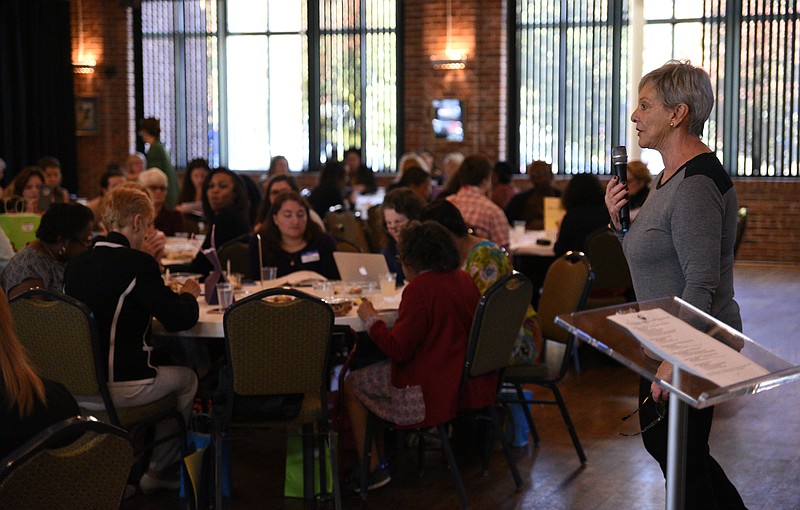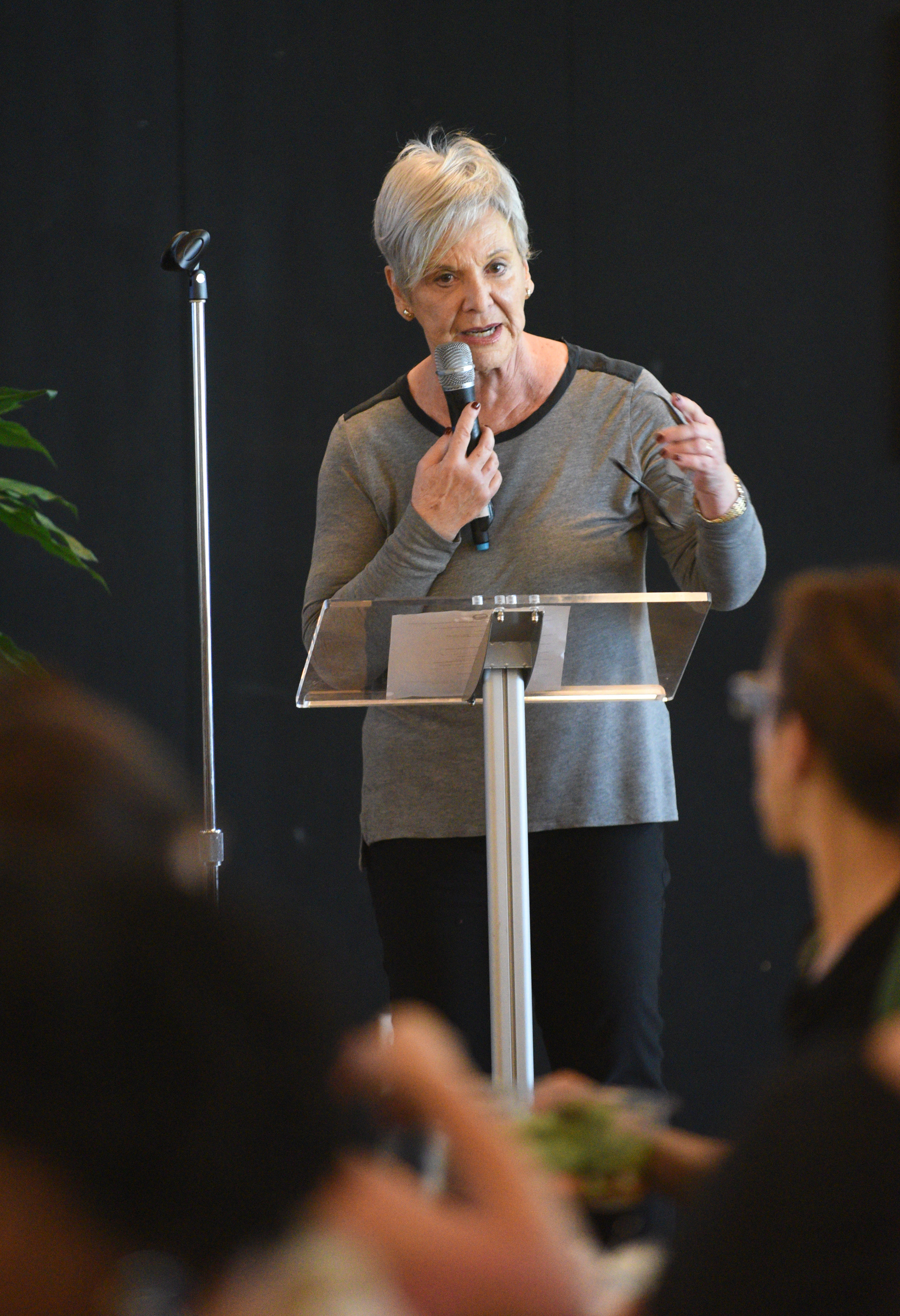Several local women's groups, energized by the current political and cultural climate, are banding together in an effort to elevate the status of women in Tennessee and get them into elected offices.
A report by the Institute for Women's Policy Research named Tennessee one of the worst states in the country for women. After comparing data on employment and earnings, poverty and opportunity, health and well-being, violence and safety, reproductive rights and political participation, Tennessee was ranked 49th in the U.S., tying with Kentucky. Only Alabama and Mississippi fared worse in the data analysis.
The findings were so troubling they led the Women's Fund of Greater Chattanooga to launch an advocacy campaign, "49 to One," to bring Tennessee women from the bottom to the top of the list, said Emily O'Donnell, executive director of the nonprofit group.
"The presidential election brought a lot of attention to women's issues," she says. "I know a number of women who felt more inclined to be political from both parties. Across Chattanooga, there is a growing organization among women not necessarily to identify with one party or another but realizing that we want our voice to be heard."
If you go
What: Statewide Women’s Policy Conference, hosted by the city of Chattanooga Mayor’s Council for WomenWhen: Friday, Feb. 9, 7:30 a.m.Where: Westin ChattanoogaTo register: visit bit.ly/womenspolicyconference.
More Info
If you are a woman interested in running for political office, contact the Empower Women PAC at connect@empowerwomen pac.com or visit its website at empowerwomenpac.com.
Fast facts
* 21 percent of 100 U.S. Senate seats are held by women. Sixteen are Democrats and five are Republicans.* 19.3 percent of 435 seats in the U.S. House of Representatives are held by women. Sixty-two are Democrats and 22 Republicans.* 23.7 percent of 312 statewide executive positions (including governors, lieutenant governors and other statewide elected officials) are held by women nationally.* 21 percent of mayors in cities with over 30,000 population are women, nationally.* 25.1 percent of 7,383 state legislators nationwide are women.Source: Center for American Women and Politics, Eagleton Institute of Politics, Rutgers University
Reversing the low status of women in Tennessee won't be easy, O'Donnell said. A lot of grassroots political work will need to be done.
Data suggests one of the biggest reasons women aren't thriving in Tennessee is because they are not well represented in the state's capital.
Only 66 percent of women are registered to vote in Tennessee, according to the Institute for Women's Policy Research, and only 44.7 percent of women vote. In the state Legislature, women hold just 17.4 percent of the seats, even though women represent more than half of the state's population.
Still, Tennessee women have made some progress in the last decade, according to the report. Since 2004, the percentage of women registered to vote jumped almost 2 percent and the percentage of women who voted jumped 2.2 points. The number of women in elected office increased slightly, as well.
"For us to be 49th says a lot about how our men and children are fairing also," O'Donnell says. "You can't have a state where women are 49th and men and children are thriving. When women aren't doing well the whole society isn't doing well."
In addition to the "49 to One" campaign, the League of Women Voters is reviving its local chapter, and the city of Chattanooga Mayor's Council for Women is hosting a statewide women's policy conference on February 9 at the Westin hotel.
"The time has come for women across the state to take responsibility for the policy decisions that impact them and their families," says Carol Berz, city councilwoman and conference chairwoman, in a statement. "This conference is another way the Mayor's Council is bringing women together to discuss genuine solutions to the real problems facing all women."
Another group has formed a political action committee to recruit, train and support women who want to run for office in Hamilton County.
April Goebeler, co-founder of Empower Women PAC, said while more women are needed in Nashville, they're needed in local seats of power, too.
In Soddy-Daisy, for example, there are five elected city officials and none are women, she said. Out of nine Hamilton County commissioners, there is only one woman, and neither the city nor the county has ever been led by a woman.
"The numbers are really bad," Goebeler says. "Once you get women to the polls they are equally as likely to be elected as men. We just need women to step up to the plate and run."
The problem, she said, is that women aren't asked to run for office and often don't believe they are qualified. That is why just 20 percent of elected representatives nationally are women. Democratic women account for 15 percent and Republican women account for 5 percent.
Still, their effort to draw more women into politics is nonpartisan, she added.
"It's parity over party," Goebeler says. "Women make good decisions. They are good collaborators. They reach across the aisle. They compromise. We need more women to be pushing through a legislative agenda that is important to women because we are 51-52 percent of the population in Tennessee."
Like O'Donnell, Goebeler said the PAC is working to galvanize women who remain frustrated by the tone of the most recent presidential election and feel emboldened by the success of the #MeToo movement, which continues to upend workplace norms as celebrities, politicians and businessmen are outed for sexually inappropriate behavior.
"Donald Trump's campaign really fired up a lot of women on both sides," she says. "A lot of Republican women were very off put by some of the things that were said during the campaign. I know a lot of women who are pro-life who marched at the women's march. It's not about partisanship. It's about women and women being treated correctly and not being sexually harassed and sexually assaulted and having equal pay and having access to birth control and health care."
So far, several women have expressed interest in running for local office, Goebeler said. Hamilton County residents go to the ballot box three times this coming year, and with a lot of positions up for grabs, 2018 could prove to be a turning point.
The Empower Women's PAC plans to hold training sessions to help any interested female candidates understand the ins and outs of running for office. It is also working to recruit younger women who can work as campaign volunteers and prepare for their own political careers.
PAC leaders are also discussing other ways they can offer support to female candidates. Often, women are juggling work and the role of primary caregiver, Goebeler said. So local women may need to wrap around female candidates by offering child care and even frozen meals, she added.
"We want to eliminate barriers," Goebeler says.
One big barrier was eliminated several months ago when Tennessee launched its first online voter registration system, said Kelley Elliott, statewide civic engagement coordinator for Civic TN, a local nonprofit organization working to promote collaborations that can bolster civic engagement across the state.
Women and men in Tennessee have long been deeply disengaged in the political process. In fact, Elliott said, Tennessee ranks 50th in voter participation in the country.
That may change, however, if women's groups continue to work together and take advantage of the momentum of the moment.
"I have been in this for a while but I have never seen this much interest," Elliott says. "A lot of people want to get engaged right now. It's great."
In Alabama, where a Democrat was elected to the U.S. Senate for the first time in decades, women and black voters showed up in record numbers and illustrated the power their shared voice can wield.
"Women are pulling us back to the issues that unite us, having health care for your family, having quality education, having living-wage jobs so you can provide, having the things that communities need to be healthy," Elliott says. "They are transcending party and partisan politics. Women are the ones that will do it."

